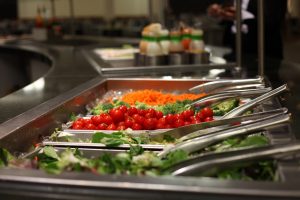Leos has always created questions and confusion for students: what to eat? who to sit with? how to not sit alone? And now: where to throw away your waste after you’ve finished eating?
When students returned to Leo’s this semester, they found previously reusable dishes replaced by single-use plasticware, a decision the university made as a precaution against the spread of COVID-19. With increased waste from the facility, some students are calling for a reversal to reusable dishes and utensils, a reimplementation of a compost program, and a zero-waste manager to improve the dining hall’s sustainability.
While Leo’s itself has been open to working with students from Georgetown Renewable Energy and Environmental Network (GREEN) and has done pre-consumer composting and back-of-the-house recycling of waste created during food preparation for over a decade, their reliance on single-use plastics and lack of composting options for students have frustrated GREEN for years.
“I think we need to celebrate them for [what they’re doing] because that’s really big, but at the same time, we still need to push them to do better,” Noelle Gignoux (SFS ’22), a member of GREEN who focuses on waste reduction, said. “So kind of walking the line between yay, thank you for doing all of these great things, but we can still do better.”
One previous success was the dining hall’s use of reusable dishes, which generate far less waste than a single-use container. This year, Leo’s moved entirely to single-use plastic dishware, though as Anu Lamsal (SFS ’23), GREEN’s president, pointed out, this was not an internal decision mandated by the Center for Disease Control. When asked why this is the case, Leo’s Guest Experience manager, Gizman Wabar, explained that this decision was out of an abundance of caution and that Leo’s hopes to transition back to reusables in the spring semester if public health conditions allow.
Even more frustrating, GREEN members have observed students not recycling those plastics, which to them feels like a step back from before the pandemic, when education around recycling had improved. Some students who frequent Leo’s report confusion around what items can be recycled, especially since students new to campus have never received any instruction on how to recycle in Leo’s. This is only increased by the fact that the specific utensils and dishes provided change frequently. The variation in utensils and dishes combined with badly marked bins means students tend to err on the side of simply using the trash for fear of accidentally recycling something that isn’t recyclable.
Food waste is another issue that Leos faces. When asked for an estimate on how much food waste Leo’s generates, Wabar did not answer but did provide how Leo’s calculates the amount to cook for the student body each day.
“We cook in batches for each meal period and reassess our batch portions 2-3 times during the day to accommodate the demand,” Wabar wrote in an email to the Voice. “Our menus are saved in a database that allow us to track what is being eaten and what is leftover. This data is then used to build future menus and improve our batch portions.”
Students from GREEN have been working to limit the waste and sponsored an event on Nov. 3 with Leo’s to hand out composting and reusable silverware kits during lunchtime. Composting has also been a recurring theme in conversations about Leo’s waste reduction.
A past pilot compost program run by GREEN and the Office of Sustainability in 2019 featured volunteers explaining to students what could be composted and directing students to place uneaten food in compost containers. According to Vice President of Sustainability Meghan Chapple, a reiteration of the program is set to begin downstairs Leo’s sometime soon, yet the exact start date has not been announced. GREEN is also hoping to bring composting programs back to the Georgetown farmers market.
Chapple also promised that the university was in the process of hiring a zero-waste manager to implement a philosophy of zero waste across university departments at a recent town hall. Though Georgetown has made this commitment many times in the last four years, Gignoux is hopeful this time the promise will stick.
“I think had the pandemic not happened we would have a zero-waste manager right now,” she said, referring to the hiring freeze implemented during the pandemic. “I would like to see one before I leave.”
In addition to a zero-waste manager, GREEN students also want to increase education to students about waste. Georgetown uses a single-stream model of recycling, which means all recyclable items, like utensils, can be put in the same bin. Composting, meanwhile, entails disposing of uneaten food scraps in order to reuse nutrients in food production.
“I think a lot of education will need to be done around that,” Giginoux said of the waste disposal systems in Leo’s. GREEN has also advocated for mandating a waste and recycling module as part of a student’s arrival to campus.
“That’s something that GREEN is also looking forward to, is really being a hub of education and knowledge sharing when it comes to plastics and zero waste,” Giginoux said.






